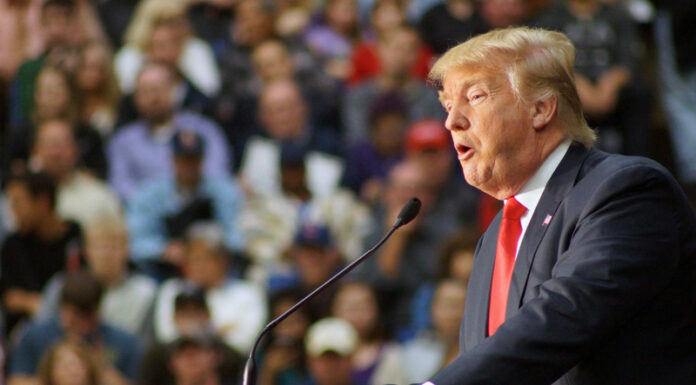President Donald Trump shook up his national security team on Thursday, May 1, removing Mike Waltz as national security adviser and appointing Secretary of State Marco Rubio to fill the position on an interim basis. This marks the first major change in Trump’s inner circle since he took office in January and comes after a turbulent period for his national security establishment.
Trump announced the personnel change through a social media post, stating he would nominate Waltz to serve as the next U.S. ambassador to the United Nations. “From his time in uniform on the battlefield, in Congress and, as my National Security Advisor, Mike Waltz has worked hard to put our Nation’s Interests first,” Trump wrote.
The shake-up was so sudden that State Department spokesperson Tammy Bruce learned about it from reporters during a press briefing. When informed of the news, Bruce remarked that the past 100 days have been like “hanging onto a freaking bullet train.”
Waltz, a retired Army Green Beret and former Republican congressman from Florida, had faced mounting criticism within the White House, particularly after a March incident in which he inadvertently added the editor-in-chief of The Atlantic magazine to a private Signal chat group where high-ranking Trump officials were discussing plans for a bombing campaign in Yemen.
The fallout from this security breach, dubbed by some as “Signalgate,” clearly damaged Waltz’s standing with the president. At a subsequent Cabinet meeting with Waltz present, Trump made a pointed comment about the importance of holding sensitive conversations in secure settings. Jeffrey Goldberg, the Atlantic’s editor, later published details of the administration’s internal discussions about the military operation.
With Rubio’s appointment, he becomes the first person since Henry Kissinger in the 1970s to simultaneously hold the positions of Secretary of State and National Security Adviser. Trump has expressed significant confidence in Rubio’s abilities, saying at a White House event earlier on Thursday, “When I have a problem, I call up Marco. He gets it solved.”
The change comes after Trump reached the 100-day mark in his second term. According to sources familiar with the matter, the president had wanted to reach this milestone before making any cabinet-level personnel changes.
Waltz’s deputy, Alex Wong, an Asia expert who previously served as a State Department official focused on North Korea during Trump’s first term, is also being forced out of his position, according to two people familiar with the situation.
The Waltz ouster caps a tumultuous month for Trump’s national security apparatus. Since April 1, at least 20 National Security Council staffers have been dismissed, the director of the National Security Agency has been removed, and three high-ranking Pentagon political appointees have been shown the door.
These widespread dismissals have significantly affected morale in some areas of the national security establishment. Several officials close to the administration have indicated that certain elements of the government are now experiencing a shortage of relevant national security expertise, and in some cases, they’ve struggled to attract high-level talent.
The personnel changes reportedly began after Laura Loomer, a right-wing activist, presented Trump with a list of individuals in the NSC she deemed disloyal during a White House meeting. Following that interaction, four senior directors were released from their positions.
These initial dismissals involved officials who oversaw intelligence, technology, international organizations, and legislative affairs. According to two people with direct knowledge of the matter, the dismissed officials had long histories in conservative policymaking and no apparent animosity toward Trump, leaving colleagues confused by their removal.
Some within the NSC were reportedly disappointed that Waltz didn’t more forcefully defend his staff against these purges. Since those initial removals, more than 20 additional NSC staffers of various profiles have been let go, typically without notice.
Beyond the Signal controversy, other factors contributed to Waltz’s removal. A person familiar with the Cabinet’s internal dynamics said Waltz was considered too hawkish for the war-averse Trump and was seen as ineffective at coordinating foreign policy among various agencies — a key responsibility for the national security adviser.
Vice President JD Vance, however, pushed back against characterizations that Waltz was being forced out due to the Signal controversy. “We brought Mike on to do some serious reforms in the National Security Council. He has done that,” Vance said in an interview with Fox News. Vance emphasized that Waltz continues to have the trust of both him and the president, describing the move to the UN ambassador role as a transition beyond the reform phase of the NSC.
The departure of Waltz could concern U.S. partners in Europe and Asia who viewed him as supportive of traditional alliances such as NATO and as a moderating influence against more antagonistic views toward those alliances from other Trump aides, according to one foreign diplomat in Washington who spoke on condition of anonymity.
The UN ambassador position has been vacant since Trump withdrew the nomination of New York Republican Representative Elise Stefanik because her vote was needed in the House of Representatives, which Republicans hold by a narrow margin.
The shakeup represents a significant moment for Trump’s administration. During his first term, Trump cycled through four national security advisers: Michael Flynn, H.R. McMaster, John Bolton and Robert O’Brien. The national security adviser position is particularly influential because it does not require Senate confirmation.
This personnel change also significantly elevates Rubio’s already substantial role in the administration. While the dual appointment is intended to be temporary, it consolidates considerable foreign policy power in the hands of the former Trump critic turned ally.
Rubio has previously indicated his commitment to addressing security breaches like the Signal incident. Following the revelation of the chat leak in March, Rubio vowed there would be reforms and changes to prevent such incidents from recurring, stating firmly, “It’s not going to happen again.”
Trump has not yet indicated who might permanently replace Waltz as national security adviser, though several names have been floated in Washington circles, including Trump’s special envoy Steve Witkoff and former acting Director of National Intelligence Richard Grenell.








